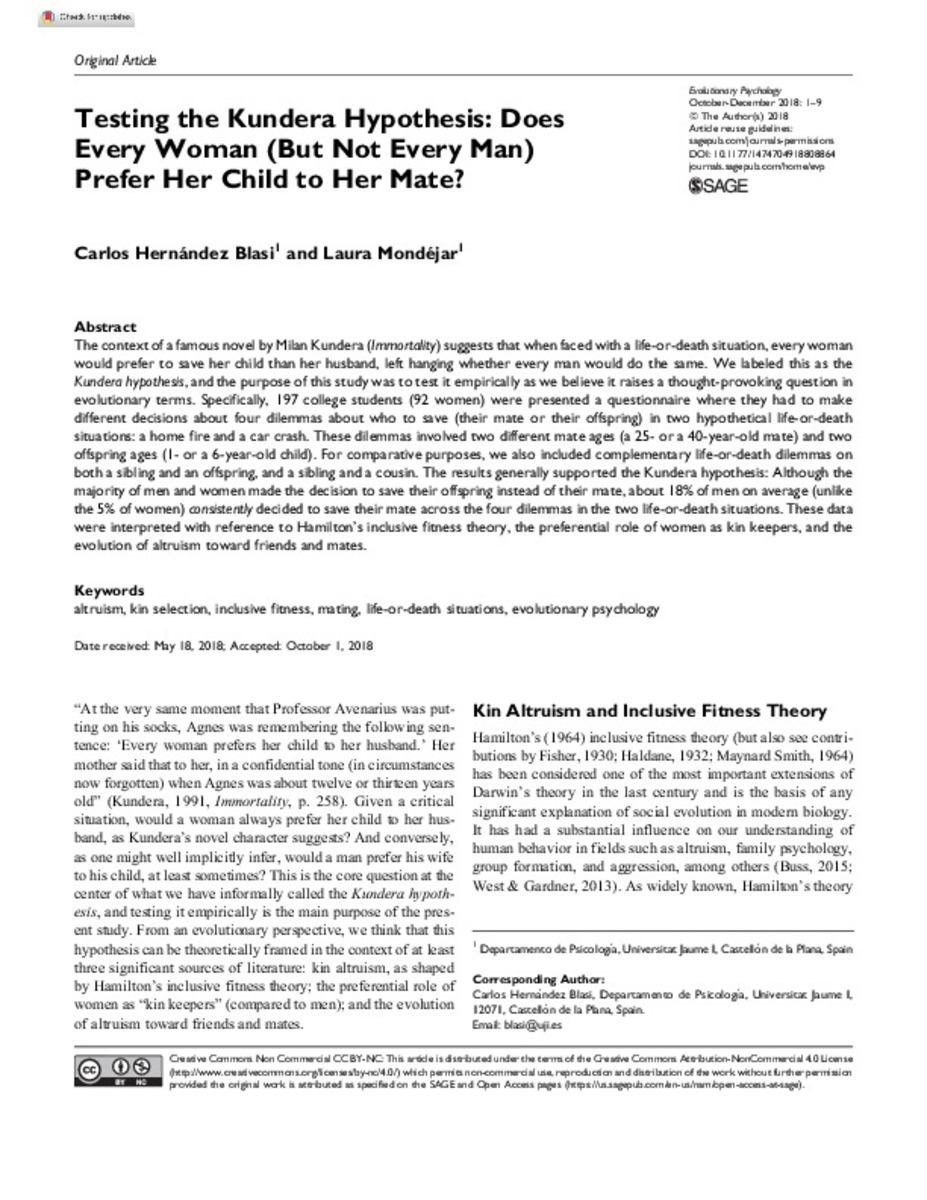Mostrar el registro sencillo del ítem
Testing the Kundera Hypothesis: Does Every Woman (But Not Every Man) Prefer Her Child to Her Mate?
| dc.contributor.author | Hernández Blasi, Carlos | |
| dc.contributor.author | Mondéjar Sebastián, Laura | |
| dc.date.accessioned | 2018-12-11T07:57:40Z | |
| dc.date.available | 2018-12-11T07:57:40Z | |
| dc.date.issued | 2018-10-31 | |
| dc.identifier.citation | HERNÁNDEZ BLASI, Carlos; MONDÉJAR SEBASTIÁN, Laura (2018). Testing the Kundera Hypothesis: Does Every Woman (But Not Every Man) Prefer Her Child to Her Mate? Evolutionary Psychology, online 31/10/2018 | ca_CA |
| dc.identifier.uri | http://hdl.handle.net/10234/177989 | |
| dc.description.abstract | The context of a famous novel by Milan Kundera (Immortality) suggests that when faced with a life-or-death situation, every woman would prefer to save her child than her husband, left hanging whether every man would do the same. We labeled this as the Kundera hypothesis, and the purpose of this study was to test it empirically as we believe it raises a thought-provoking question in evolutionary terms. Specifically, 197 college students (92 women) were presented a questionnaire where they had to make different decisions about four dilemmas about who to save (their mate or their offspring) in two hypothetical life-or-death situations: a home fire and a car crash. These dilemmas involved two different mate ages (a 25- or a 40-year-old mate) and two offspring ages (1- or a 6-year-old child). For comparative purposes, we also included complementary life-or-death dilemmas on both a sibling and an offspring, and a sibling and a cousin. The results generally supported the Kundera hypothesis: Although the majority of men and women made the decision to save their offspring instead of their mate, about 18% of men on average (unlike the 5% of women) consistently decided to save their mate across the four dilemmas in the two life-or-death situations. These data were interpreted with reference to Hamilton’s inclusive fitness theory, the preferential role of women as kin keepers, and the evolution of altruism toward friends and mates. | ca_CA |
| dc.format.extent | 9 p. | ca_CA |
| dc.format.mimetype | application/pdf | ca_CA |
| dc.language.iso | eng | ca_CA |
| dc.publisher | SAGE | ca_CA |
| dc.relation.isPartOf | Evolutionary Psychology (2018), online 31/10/2018 | ca_CA |
| dc.rights | Atribución-NoComercial 4.0 Internacional | * |
| dc.rights.uri | http://creativecommons.org/licenses/by-nc/4.0/ | * |
| dc.subject | Altruism | ca_CA |
| dc.subject | Kin selection | ca_CA |
| dc.subject | Inclusive fitness | ca_CA |
| dc.subject | Mating | ca_CA |
| dc.subject | Life-or-death situations | ca_CA |
| dc.subject | Evolutionary psychology | ca_CA |
| dc.title | Testing the Kundera Hypothesis: Does Every Woman (But Not Every Man) Prefer Her Child to Her Mate? | ca_CA |
| dc.type | info:eu-repo/semantics/article | ca_CA |
| dc.identifier.doi | https://doi.org/10.1177/1474704918808864 | |
| dc.rights.accessRights | info:eu-repo/semantics/openAccess | ca_CA |
| dc.relation.publisherVersion | https://journals.sagepub.com/doi/10.1177/1474704918808864 | ca_CA |
| dc.type.version | info:eu-repo/semantics/publishedVersion | ca_CA |
Ficheros en el ítem
Este ítem aparece en la(s) siguiente(s) colección(ones)
-
PSI_Articles [589]
Articles de publicacions periòdiques








